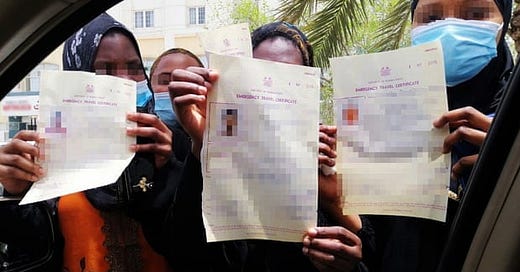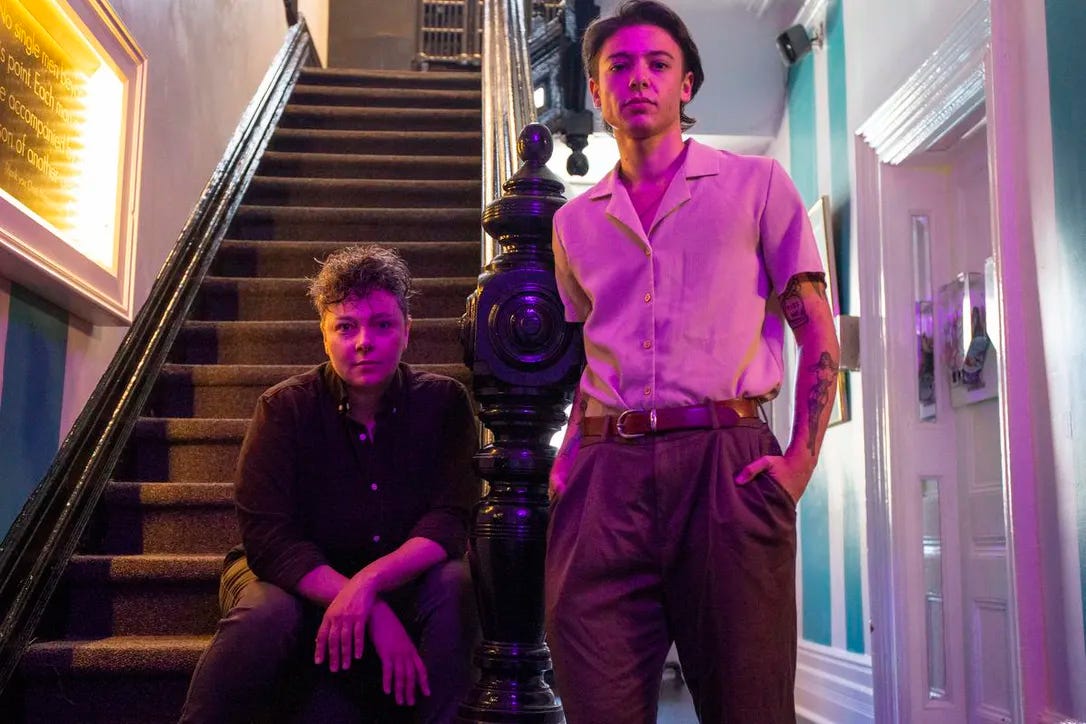Global Roundup: Oman Migrant Workers, Indigenous Sisters Create Video Games, Egypt Femicide, Pussy Palace Legacy, Chinese Intersex & LGBTQ+ Activist
Curated by FG contributor Samiha Hossain
Do Bold interviewed workers from Sierra Leone working in Oman. Photograph: Do Bold via The Guardian
CW: gender-based violence
Do bold interviewed 469 domestic workers from Sierra Leone working in Oman and concluded that all but one of them were victims of forced labour and human trafficking. Some women claimed they had been promised jobs in restaurants and hotels in Europe or the US, while others said they believed they had applied for scholarships to study abroad. They said they were then trafficked into domestic work when they arrived in Oman. The women reported working long hours and 99% had no day off. More than half said they had experienced wage theft, and one-third claimed they had been sexually abused.
For each woman we interviewed, it is a crisis that is significantly affecting their health and wellbeing. It begs the question of what needs to be done to solve this issue. -Ekaterina Porras Sivolobova, founder and director of Do Bold
Migrant domestic workers employed in Oman work under the kafala sponsorship system, which ties their legal status to their employer. If a worker breaks the contract and leaves, it is considered a crime and can lead to the worker being jailed. One 20-year-old domestic worker said she called the Omani police to report abuse, believing her life was in danger. She said the police visited her employer’s home but then left without her – her employers then locked her in a room without food as punishment.
Do Bold is calling on Oman to take steps to effectively monitor human trafficking and to allow abused or trafficked migrant workers access to justice.
Kahentawaks (right) and Wennekerakon Tiewishaw are sisters from Kanesatake, a Kanien’kehá:ka (Mohawk) community located northwest of Montreal. (Submitted by Kahentawaks Tiewishaw ) via CBC
Having video games be such a big part of my childhood, it would have been super helpful to be able to play games in Mohawk to reinforce the things I was learning. I just want to be able to provide those things for the next generation. -Kahentawaks Tiewishaw
Kahentawaks, 30, studied computation arts and in 2020, she co-founded Revital Software, along with her sister and their friend Frederyk Kowalczyk. The company specializes in the creation of Kanien'kéha language revitalization games and resources. For Kahentawaks, it is about bringing the skills she learned in university back to her community.
We're encouraging our youth to stay in school and to pursue their interests but a lot of us end up leaving and then maybe never coming back. This is my way of bringing it back to the community and engaging with my culture in my own way. -Kahentawaks Tiewishaw
Kahentawaks's first mobile game, called Karihonniennihtshera (Teachings), was exhibited at the 2019 ImagineNATIVE Film + Media Arts Festival in Toronto. It is a bilingual interactive storybook playable in both English and Kanien'kéha, following a young girl named Ietsistohkwaroroks as her grandmother teaches her about the flora and fauna in their territory, and the importance of taking care of Mother Earth.
That's really important to me because it's something I wish we had when we were growing up. I think it's really cool that we can provide that. -Wennekerakon Tiewishaw
So far, the sisters have made seven games as a company, with most developed for a school in Kahnawake. Their goal is to create an online library of Kanien'kéha games that is available to the public. They have been applying to different grants and also are a semi-finalist in the technology and innovation category of the Pow Wow Pitch.
Amani Abdul-Karim al-Gazzar, 19, was shot dead by a man after she refused to get engaged to him, September 4, 2022. (Twitter)
CW: gender-based violence
A young woman has been murdered in Egypt after turning down a marriage proposal from her killer. Amani Abdul-Karim is the third female murder victim in Egypt in just three months – each was murdered after refusing to marry the killer.
What happened is not just an ordinary crime, it is a new crime of violence against women, and it is a femicide. We note that violence in general is increasing in Egypt, especially violence from the state against all citizens. At least identifying the crime and labelling it correctly helps us determine the reasons it is happening and helps us find solutions to protect women. -Shaimaa Elbanna, spokeswoman for the Committee for Justice
Amani was murdered not long after an outpouring of solidarity with student Naira Ashraf, who in June was killed outside Mansoura University. The footage of the murder went viral and the killing shook Egypt, especially after it emerged that the killer harassed Naira for a year, to the knowledge of authorities. The killer edited Naira’s face onto pornographic images and sent her death threats for months before murdering her. Naira reported him to the cybercrime police unit and filed two restraining orders against him, yet her lawyer said the police did not undergo proper legal procedures and action was not taken against him.
State-run media perpetuated misogynistic narratives about Naira’s murder. Her autopsy was published, focusing on the results of her “virginity test” and whether her hymen was intact. Then a discussion erupted online. Why didn't Naira wear the headscarf? Could other women who chose not to wear it be subject to the same act of violence?
Just one and a half months after Naira's brutal murder, Salma Bahgat was murdered after her killer had posted a story on his social media threatening Salma after she turned down his marriage proposal with a firm "no.”
As Amina's story spreads on social media, observers continue to mourn Naira and Salma, call for urgent justice for women in Egypt, and for the attention to be put squarely on what happened, rather than what they were wearing.
The killings are an extension of violence against women in Egypt, which began with threats, beatings and harassment, and have continued every day without confrontation or clear rejection by society. -Shaimaa Elbanna
Project manager Alisha Stranges and oral historian Elio Colavito of the Pussy Palace Oral History Project next to an original staircase from the former site of the Pussy Palace bathhouse for women and transgender people, now the Oasis Aqualounge. PAIGE TAYLOR WHITE / TORONTO STAR
In September 2000, the Pussy Palace was hosting the “2,000 pussies” party, in celebration of the second anniversary of the Pussy Palace, Toronto’s first ever, open-to-the-public bathhouse for women and transgender people of all sexual identities. Not long after midnight, the cops showed up and started to search the premises. The search would mark the beginning of the last queer bathhouse raid in Toronto. And one of the reasons it would be the last is because the Toronto Police Service could not find what it was looking for.
There were lap dances on offer that night, as well as other sexual services, but nobody was getting paid. No money changed hands. It was designed to be a sex-positive, woman-centred, trans-inclusive space for women who wanted to explore their sexuality. Or, as the team of researchers working on the LGBTQ Oral History Digital Collaboratory call it, “a historic moment of radical sexual culture.”
It was important to us for people to have a lot of space to talk about their joyful fun and all the experiences they had at the bathhouse, both the night it was raided and every other night they might have gone. -Alisha Stranges, research manager at the collaboratory
When historians or journalists discuss the Pussy Palace, the focus is generally on the raid. The historians at the collaboratory, though, realized that learning about the significance of the space went well beyond a single night. The research will all soon culminate in a digital media project, scheduled to launch this fall, that allows people to explore what it would have been like to attend a Pussy Palace party two decades ago.
I think when we began the project, we were definitely like yes, the raid, this is what we’re here for. But as the project developed and we got to talking to people, it felt more important to preserve the joyfulness, the radicalism and this attempt for an inclusive environment for queer women and trans people. -Elio Colavito, Oral historian for the Pussy Palace Oral History Project
The legacy of the palace is also a testament to the power of community activism and organization. Part of the reason it was the last bathhouse raid in Toronto was that meetings, protests and fundraising efforts were organized almost instantaneously. The police, who charged one organizer with violations under the Liquor Licence Act, had barely left the building before the patrons and organizers developed a plan for a “Pussies Bite Back” movement.
Chanelle Gallant, writer, activist and part of the Pussy Palace collective that organized the bathhouse events, says the event turned her into an activist. Before that night, she had just wanted to put on wild sex parties. But as she and all the other Pussy Palace organizers and collaboratory researchers were well aware, throwing inclusive wild sex parties for women and trans people was, in and of itself, a form of activism. Ultimately, the collaboratory hopes to establish a stronger link between different generations of activists in the queer community so that a kind of “ancestry” line can be etched.
At some point, most kids go up to their grandparents and ask them about where they came from and what it means to be of whatever ethnic community that you came from. Queer and trans people don’t get to have that as much, so being able to talk to a queer or trans ancestor that you can map some aspect of connection with is significant. -Elio Colavito
Yanhui Peng (Washington Blade photo by Michael Key)
Peng saw an ad on Baidu, a Chinese search engine, for a therapist in the city of Chongqing who used electroshock therapy to “cure” a person’s homosexuality. The therapist charged patients $5,000 (34,506 Chinese yuan) for 30 treatments. He decided to receive a treatment, which cost $90 (621.12 Chinese yuan) and lasted an hour. Peng kept his receipt and included it in a complaint against the therapist that he filed in court. A judge ruled in his favor, noting homosexuality is not a disease and “gay cure advertisement is illegal.” The ruling is the first time a judge in China ruled in favor of LGBTQ+ and intersex rights.
LGBT Rights Advocacy China shut down in November 2021 amid increased government restrictions against NGOs and “social activism.” Peng, who currently studies at Yale University, continues to champion LGBTQ+ and intersex rights in China. He, among other things, speaks with IBM and other companies with offices in China about the need to support their LGBTQ+ and intersex employees.
Peng, 39, was met with negative messages when he started searching about homosexuality when he was younger. He did not talk about his homosexuality with his family, in part, because his classmates bullied him because he was “kind of feminine.”
It was so negative because when I searched the term ‘tong zhi’ (gay in Chinese) it all appeared abnormal, [gay people] have sex with everybody and get diseases like HIV. I was scared. I thought it wasn’t ok. -Yanhui Peng
Peng came out to a colleague in 2010 and the positive reaction encouraged him to start coming out to others. A few years later he quit his job and co-founded LGBT Rights Advocacy China. Peng over the summer married his husband in Utah.
Samiha Hossain (she/her) is a student at the University of Ottawa. She has experience working with survivors of sexual violence in her community, as well as conducting research on gender-based violence. A lot of her time is spent learning about and critically engaging with intersectional feminism, transformative justice and disability justice.
Samiha firmly believes in the power of connecting with people and listening to their stories to create solidarity and heal as a community. She refuses to let anyone thwart her imagination when it comes to envisioning a radically different future full of care webs, nurturance and collective liberation.








